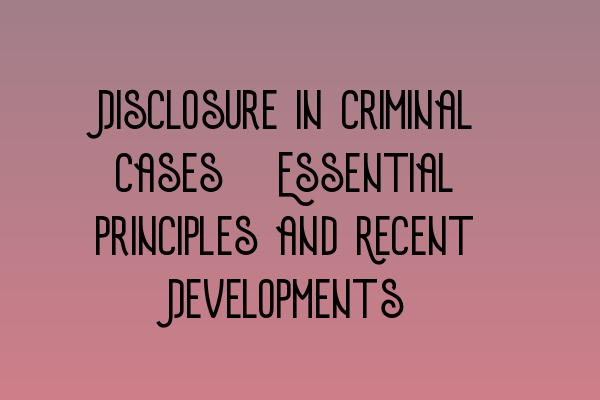Disclosure in Criminal Cases: Essential Principles and Recent Developments
In criminal cases, disclosure plays a crucial role in ensuring a fair trial. The principle of disclosure requires the prosecution to disclose all relevant material to the defense in a timely manner. This allows the defense to properly prepare their case and challenge the evidence presented by the prosecution. In recent years, there have been significant developments in the law concerning disclosure, making it imperative for criminal lawyers to stay up to date with these changes.
One of the fundamental principles of disclosure is that it is an ongoing duty. This means that the prosecution has a continuous obligation to disclose new material as it becomes available. Failure to do so can have serious consequences, including the possibility of the trial being halted or a conviction being overturned on appeal.
To ensure compliance with the disclosure obligations, the Criminal Procedure and Investigations Act 1996 (CPIA) sets out a framework for the handling of evidence in criminal cases. This includes the provision of initial disclosure, which requires the prosecution to disclose a summary of their case and the evidence they intend to rely on. This allows the defense to assess the strength of the prosecution’s case and identify any potential weaknesses.
In addition to initial disclosure, there is also a duty on the prosecution to disclose unused material. This refers to any material that is not being relied upon by the prosecution but may be relevant to the defense. The test for disclosure of unused material is whether it meets the disclosure test, which requires the material to be relevant to the case, either assisting the defense or damaging the prosecution’s case.
Recent developments in the law have placed an increased emphasis on digital disclosure. As technology continues to advance, the amount of digital evidence in criminal cases, such as CCTV footage, social media posts, and mobile phone records, has significantly increased. This has presented new challenges for both the prosecution and the defense in ensuring the disclosure of this digital evidence.
In response to these challenges, the Attorney General’s Guidelines on Disclosure were published in 2018. These guidelines provide detailed guidance for prosecutors on the disclosure process and address the specific issues related to digital evidence. They emphasize the need for early engagement between the prosecution and the defense to identify and resolve any disclosure issues arising from digital evidence.
It is essential for criminal lawyers to be familiar with these guidelines and to have the necessary skills and expertise to effectively handle digital disclosure. This includes the ability to navigate complex digital systems and analyze large volumes of data to identify relevant material. By staying updated and investing in relevant training, lawyers can ensure that they are well-equipped to handle the increasing demands of digital disclosure in criminal cases.
In conclusion, disclosure is a fundamental aspect of the criminal justice system, ensuring that all parties have access to relevant information for a fair trial. Recent developments in the law have highlighted the importance of digital disclosure and the need for lawyers to adapt to these changes. By staying informed and investing in ongoing training, criminal lawyers can provide effective representation to their clients and ensure that the principles of disclosure are upheld.
Related Articles:
– SQE 1 Practice Exam Questions
– SQE 1 Practice Mocks FLK1 FLK2
– SQE 2 Preparation Courses
– SQE 1 Preparation Courses
– SRA SQE Exam Dates
